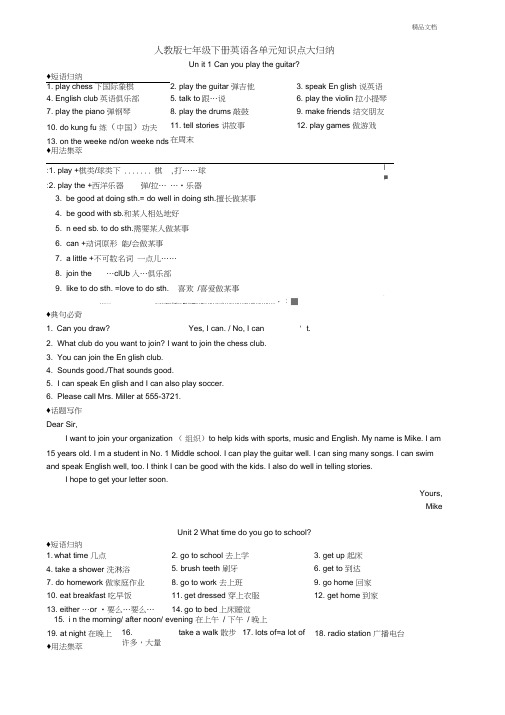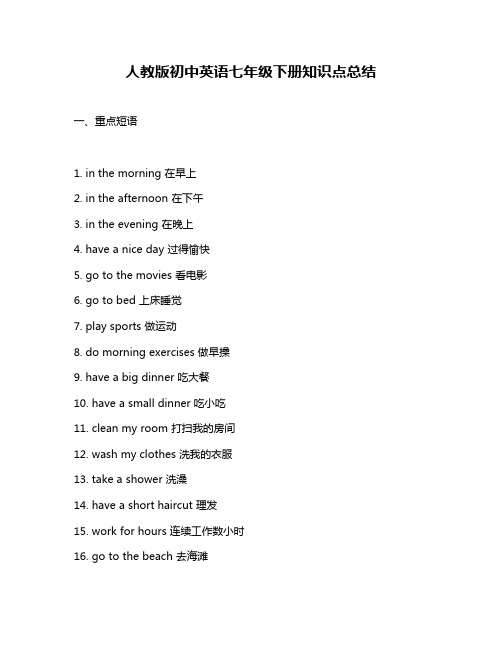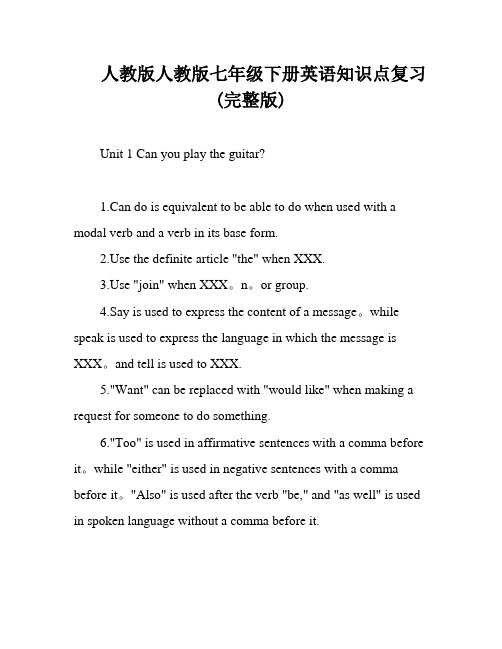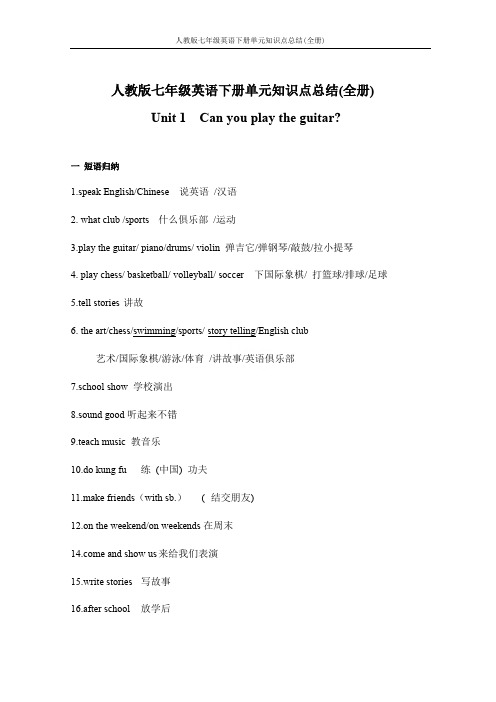新人教版七年级下册英语知识点
新人教版英语七年级下册各单元知识点汇总

人教版七年级下册英语各单元知识点大归纳Un it 1 Can you play the guitar?♦短语归纳1. play chess 下国际象棋2. play the guitar 弹吉他3. speak En glish 说英语4. English club 英语俱乐部5. talk to 跟…说6. play the violin 拉小提琴7. play the piano 弹钢琴8. play the drums 敲鼓9. make friends 结交朋友 10. do kung fu 练(中国)功夫11. tell stories 讲故事12. play games 做游戏13. on the weeke nd/on weeke nds 在周末♦用法集萃:1. play +棋类/球类下 ....... 棋 ,打……球 I ■ :2. play the +西洋乐器弹/拉… …•乐器*3. be good at doing sth.= do well in doing sth.擅长做某事4. be good with sb.和某人相处地好5. n eed sb. to do sth.需要某人做某事6. can +动词原形 能/会做某事7. a little +不可数名词 一点儿……8. join the…clUb 入…俱乐部9. like to do sth. =love to do sth. 喜欢 /喜爱做某事:・・・— —DE —B n: & ■ ■ n tii ■< n IB L ■■ a ta b ■■ a ・・■■・・・a ・・IJII ・・it ・・・u ・・・n ・・・an ・・uai ・・a ・・・a ・・・u・:■♦典句必背1. Can you draw?Yes, I can. / No, I can' t.2. What club do you want to join? I want to join the chess club.3. You can join the En glish club.4. Sounds good./That sounds good.5. I can speak En glish and I can also play soccer.6. Please call Mrs. Miller at 555-3721.♦话题写作Dear Sir,I want to join your organization ( 组织)to help kids with sports, music and English. My name is Mike. I am 15 years old. I m a student in No. 1 Middle school. I can play the guitar well. I can sing many songs. I can swim and speak English well, too. I think I can be good with the kids. I also do well in telling stories.I hope to get your letter soon.Yours, MikeUnit 2 What time do you go to school?♦短语归纳15. i n the morning/ after noon/ evening 在上午 / 下午 / 晚上 16.take a walk 散步 17. lots of=a lot of 许多,大量1. what time 几点 4. take a shower 洗淋浴2. go to school 去上学 5. brush teeth 刷牙 7. do homework 做家庭作业 10. eat breakfast 吃早饭13. either …or •要么…要么… 8. go to work 去上班 11. get dressed 穿上衣服14. go to bed 上床睡觉 3. get up 起床 6. get to 到达 9. go home 回家 12. get home 到家19. at night 在晚上 ♦用法集萃18. radio station 广播电台20. be late for=arrive late for 迟至U:1. at +具体时间点在几点(几分) 2. eat breakfast/ lunch/dinner 吃早饭 /午饭 /晚饭 3. thirty\half past + 基数词 ... 点半 -4. fifteen\a quarter to + 基数词 差一刻到 ... 点 5. take a/an +名词 从事 .. 活动 6. from …to … 从 ... 到] . -7. need to do sth需要做某事1 —…•.亠 >.…一…U …J亠…亠十亠十亠十亠十——亠—―———L♦典句必背1. What time do you usually get up? I usually get up at six thirty.2. That ' s a funny time for breakfast.3. When do stude nts usually eat dinner?They usually eat dinner at a quarter to seve n in the eve ning.4. In the evenin g, I either watch TV or play computer games.5. At twelve, she eats lots of fruit and vegetables for lun ch..6. She knows it ' s not good for her, butsites good.7. Here are your clothes.♦话题写作主题:谈论日常作息习惯My School DayI am a stude nt. I usually get up at seve n, and I eat breakfast at seve n thirty. Then I go to school ateight.School starts at eight thirty. I eat lunch at twelve. I go home at 17:00. I often eat dinner at 19:00 and the n playthe pia no. I do my homework at 20:00. At 22:00, I go to bed.Unit 3 How do you get to school?♦短语归纳♦用法集萃1. take …to …=go to … by …2. How do / does (sb ) get to …'3. How far is it from…to …4. It takes sb. some time to do sth.5. How long does it take to do sth.?6. It is + adj. + to do sth.7. Thanks for + n. / Ving♦典句必背1. How do you get to school? I ride my bike.2. How far is it from your home to school?1. get to school 到达学校 4. how far 多远7. take the bus 乘公共汽车10. think of 认为 2. take the subway 乘地铁 5. from home to school 从家至U 学校 8. by bike 骑自行车3. ride a bike 骑自行车 6. every day 每天 9. bus stop 公共汽车站 11. betwee n …and 在…和…之间 12. one 11-year-old boy 一个 11 岁的男孩 13. play with 和…玩14. come true 实现 15. have to 不得不乘…去… …是怎样到…的? 从…到…有多远? 做某事花费某人多长时间。
人教版初中英语七年级下册知识点总结

人教版初中英语七年级下册知识点总结一、重点短语1. in the morning 在早上2. in the afternoon 在下午3. in the evening 在晚上4. have a nice day 过得愉快5. go to the movies 看电影6. go to bed 上床睡觉7. play sports 做运动8. do morning exercises 做早操9. have a big dinner 吃大餐10. have a small dinner 吃小吃11. clean my room 打扫我的房间12. wash my clothes 洗我的衣服13. take a shower 洗澡14. have a short haircut 理发15. work for hours 连续工作数小时16. go to the beach 去海滩17. on the weekend 在周末18. listen to music 听音乐19. have a party 举办聚会20. watch TV 看电视21. play computer games 玩电脑游戏22. in the pool 在游泳池里23. go to the zoo 去动物园24. in the mountains 在山里25. have fun 玩得开心26. the great wall 长城27. many places of interest 名胜古迹28. be ready for 为……准备好29. stay healthy 保持健康30. how much 多少31. would you like 一些……吗?32. some noodles 一些面条33. order a pizza 定一个披萨饼34. make a phone order 电话订购35. would you like to do sth 你愿意做某事吗?36. want to do sth 想做某事37. would you like +名词你愿意要……吗?38. would you like +动词不定式你愿意……吗?39. choose some food 选择一些食物40. order the food 订购食物41. be careful 当心;小心42. not much 不多;少量的43. be ready to do sth 准备好做某事。
新人教版|七年级下册英语所有语法知识点全汇总

一. 情态动词can的用法can+动词原形,它不随主语的人称和数而变化。
1. 含有can的肯定句:主语+can+谓语动词的原形+其他。
2. 含有can的否定句:主语+can't+动词的原形+其他。
3. 变一般疑问句时,把can提前:Can+主语+动词原形+其他?肯定回答:Yes,主语+can。
否定回答:No,主语+can't.4. 含有can的特殊疑问句:特殊疑问词+can+主语+动词原形+其他?I can speak English.→I can't speak English.→Can you speak English? →What can you speak?二. what time和when引导的特殊疑问句1. 询问钟点时用what time,询问日期、月份、年份时用when。
2. What's the time?=What time is it?现在几点了?3. 时刻表达法:顺读法和逆读法。
顺读法:“钟点+分钟”直接读数字。
如:7: 05 seven five;8:16 eight sixteen逆读法:借助介词past或to表示,要先说分再说钟点。
a. 当分钟不超过30分钟时(包括30分钟),即<或=30,用past表示。
其结构为:“分钟+past+整点”意为“几点过几分”。
如:1:25 twenty-five past oneb. 当超过30分钟时,即>30,用to表示。
其结构为:“所差分钟(即60—所过分钟数)+to+下一个整点”,to译成“差”,差几分钟到几点。
如:4:38 twenty-two to fivec. 当分钟为30分钟用half表示,当分钟为15分钟用a quarter。
三. how引导的特殊疑问句1. how 引导的特殊疑问句提问交通方式,其答语分三种情况:a. take a/an/the+交通工具(单数)b. by+交通工具(单数)c. on/in+限定词+交通工具---How do you go to school every day?---I take a bus to go to school every day./I go to school by bus every day./I go to school on the bus every day.2. how far 用来提问距离,多远,其答语分为两种:(1)用长度单位表示:It is five kilometers.(2)用时间表示:It’s twenty minutes’walk.3. how long 用来提问时间,意为多久回答常用“for+段时”。
人教版人教版七年级下册英语知识点复习(完整版)

人教版人教版七年级下册英语知识点复习(完整版)Unit 1 Can you play the guitar?1.Can do is equivalent to be able to do when used with a modal verb and a verb in its base form.e the definite article "the" when XXX.e "join" when XXX。
n。
or group.4.Say is used to express the content of a message。
while speak is used to express the language in which the message is XXX。
and tell is used to XXX.5."Want" can be replaced with "would like" when making a request for someone to do something.6."Too" is used in affirmative sentences with a comma before it。
while "either" is used in negative sentences with a comma before it。
"Also" is used after the verb "be," and "as well" is used in spoken language without a comma before it.7."Be good at" is used to XXX or activity。
新人教版七年级下册英语重点短语与重点句型

新人教版七年级下册英语重点短语与重点句型Unit 1 Can You Play the Guitar?Key Phrases:1.Be good with - have a way with2.Play the drums - play n3.Make friends (with sb) - e friends (with someone)4.Help sb with sth - assist XXX5.Be good at (doing) - excel at (doing)6.XXX - XXX7.Join the art club - e a member of the art club8.Talk to sb - converse with someone9.Call sb at。
- dial。
to XXX10.Want to do sth - desire to do something11.Play the guitar/piano - play the guitar/piano12.Play the lin - play the lin13.Play chess - play chess14.Play volleyball - play volleyball15.On the weekend - during the weekend16.Play games with sb - play games with someoneKey XXX Structures:1.Can you swim。
- No。
I can't.2.Can you play the guitar?3.I want to join the art club.4.What club do you want to join?5.You are very good at XXX.6.Sounds good。
but I like to draw too.7.Then join two clubs。
人教版七年级英语下册单元知识点总结(全册)

人教版七年级英语下册单元知识点总结(全册)Unit 1 Can you play the guitar?一短语归纳1.speak English/Chinese 说英语/汉语2. what club /sports什么俱乐部/运动3.play the guitar/ piano/drums/ violin 弹吉它/弹钢琴/敲鼓/拉小提琴4. play chess/ basketball/ volleyball/ soccer 下国际象棋/ 打篮球/排球/足球5.tell stories讲故6. the art/chess/swimming/sports/ story telling/English club艺术/国际象棋/游泳/体育/讲故事/英语俱乐部7.school show 学校演出8.sound good听起来不错9.teach music 教音乐10.do kung fu练(中国) 功夫11.make friends(with sb.)(结交朋友)12.on the weekend/on weekends在周末e and show us来给我们表演15.write stories写故事16.after school放学后17.English-speaking students说英语的学生18.play games 做游戏19.the Students’ Sports Center学生运动中心20.at the old people’s home在老人之家21.be in our school music festival 参加学校音乐节22.jion the music club加入音乐俱乐部二用法集萃1. play +棋类/球类下……棋,打……球2. play the +乐器弹/拉……乐器3. be good at doing sth.擅长做某事be good for.. 对… 有好处be good /kind to … 对… 友好4. be good with sb. 和某人相处地好; 善于应付(处理)…5. need(sb./sth.)to do… 需要(某人/某物)做….6. can + 动词原形能/会做某事7. a little + 不可数名词: 一点儿……9. like to do sth.或like doing sth. 喜欢做某事10.want to do…想做……11.What about…?…怎么样?(后面接Ving/代词/名词)12. talk用法: talk to/with sb. 跟某人说话talk about sth. 谈论某事tell 用法:tell sb sth. 告诉某人某事tell sb to do sth 告诉某人去做某事tell stories 讲故事say用法:say直接加说话的内容/itspeak用法:speak +语言13.help sb. with sth在某方面帮助某人= help sb.(to)do sth14.be free /busy有空/很忙15. call sb. at+号码拨打某人的……号码16. be in=join …成为…中的一员(P6)17.want …for the school show为学校表演招聘……三典句必背1. Can you draw? 你会画画吗?Yes, I can. / No, I can’t.是,我会。
人教版初一英语下册知识点

人教版初一英语下册知识点
以下是初一英语下册部分重点知识点:
1. 一般现在时:表示经常或习惯性的动作或状态,常与always, usually, often, sometimes, every day 等时间状语连用。
2. 现在进行时:表示现在正在进行的动作或状态,常与now, at the moment, Look! Listen! 等时间状语连用。
3. 一般过去时:表示过去某个时间发生的动作或状态,常与yesterday, last week, in 2000 等时间状语连用。
4. 祈使句:用于表达请求、命令、建议或劝告等,通常以动词原形开头,句末用句号或感叹号。
5. There be 句型:表示“某地有某物”,其中be 动词的形式根据主语的单复数形式而定。
6. 形容词和副词的比较级和最高级:用于比较两个或两个以上的人或事物,比较级用于两者之间的比较,最高级用于三者或三者以上的比较。
7. 情态动词:表示能力、可能性、请求、建议、许可等,如can, could, may, might, must, have to 等。
人教版七年级下册英语知识点复习(完整版)

人教版七年级下册英语知识点复习(完整版) Unit 1 Can you play the guitar?1,情态动词+V原can do= be able to do2,Play+ the+ 乐器+球类,棋类3,join 参加社团、组织、团体4,4个说的区别:say+内容Speak+语言Talk 谈论talk about sth talk with sb talk to sbTell 告诉,讲述tell sb (not)to do sthTell stories/ jokes5,want= would like +(sb)to do sth6,4个也的区别:too 肯定句末(前面加逗号)Either否定句末(前面加逗号)Also 行前be 后As well 口语中(前面不加逗号)7,be good at+ V-ing=do well in 擅长于be good for 对…有益(be bad for对…有害)be good to 对…友好(good 可用friendly,nice,kind替换)be good with和…相处好=get on/ along well with8,特殊疑问句的构成:疑问词+一般疑问句9,How/ what about+V-ing …怎么样?(表建议)10,感官动词(look, sound, taste, smell, feel)+adj/ like11,选择疑问句:回答不能直接用Yes或者No,要从中选择一个回答12,students wanted for school show(wanted表示招募,含有被动意义)13,show sth to sb=show sb sth give sth to sb=give sb sth14,help sb (to)do sthHelp sb with sthWith sb’s help= with the help of sbHelp oneself to 随便享用15,be busy doing sth/ be busy with sth16,need to do sth17,be free= have time18,have friends= make friends19,call sb at +电话号码20,on the weekend= on weekends21,English-speaking students 说英语的学生(带有连词符,有形容词性质)22,do kung fu表演功夫Unit 2 What time do you go to school?1,问时间用what time或者whenAt+钟点at 7 o’clock at noon/ at night(during/ in the day)On+ 具体某天、星期、特指的一天on April 1st on Sunday on a cold winter morningIn +年、月、上午、下午、晚上2,时间读法:顺读法逆读法:分钟≤30用past five past eight(8:05)half past eight(8:30)分钟>30用to a quarter to ten(9:45)整点用…o’clock 7 o’clock(7:00)3,3个穿的区别:wear 表状态,接服装、手套、眼镜、香水等Put on 表动作,接服装Dress 表动作,接sb/ oneself get dressed穿衣3,感叹句:How+adj+主谓!How+adj+a/an +n单+主谓!What+ a/an +adj+ n单+主谓!What+ adj+ n复/ 不可数+主谓!4,from…to…5,be/ arrive late for6,频度副词(行前be 后)Always usually often sometimes seldom hardly never7,一段时间前面要用介词for for half an hour for five minutes8,eat/ have…for breakfast/ lunch/ dinner/ supper9,either…or10,a lot of=lots of11,it is +adj+for sb +to do sth (adj修饰to do sth)It is important for me to learn English.it is +adj+of sb +to do sth (adj修饰sb)It is kind/ friendly/ nice of you to help me.Unit 3 How do you get to school?1,疑问词How 如何(方式)how long 多长(时间)答语常用“(For/ about +)时间段”how far多远(距离)答语常用“(It’s +)数词 +miles/ meters/ kilometers”how often多久一次(频率)答语常用“Always/ often/ every day/…”或“次数+时间”等表频率的状语How soon多快,多久以后,常用在将来时中。
- 1、下载文档前请自行甄别文档内容的完整性,平台不提供额外的编辑、内容补充、找答案等附加服务。
- 2、"仅部分预览"的文档,不可在线预览部分如存在完整性等问题,可反馈申请退款(可完整预览的文档不适用该条件!)。
- 3、如文档侵犯您的权益,请联系客服反馈,我们会尽快为您处理(人工客服工作时间:9:00-18:30)。
-----新目标英语七年级下册知识点总结Unit1Canyouplaytheguitar?1,情态动词+V原cando=beabletodo乐器Play+the+2,球类,棋类+join,3参加社团、组织、团体个说的区别:44,内容say+语言Speak+ talkwithsbtalkaboutsthTalk谈论talktosbTell告诉,讲述tellsb(not)todosth Tellstories/jokestodosth(sb)5,want=wouldlike+肯定句末too个也的区别:6,4(前面加逗号)Either否定句末(前面加逗号)Also行前be后Aswell口语中(前面不加逗号)7,begoodat+V-ing=dowellin擅长于有益对,begoodfor(bebadfor对,有害)友好begoodto对,(good可用friendly,nice,kind替换)相处好和,begoodwith=geton/alongwellwith8,特殊疑问句的构成:疑问词+一般疑问句,怎么样?(表建议),9How/whatabout+V-ing10,感官动词(look,sound,taste,smell,feel)+adj/like11,选择疑问句:回答不能直接用或者No,要从中选择一个回答Yes12,studentswantedforschoolshow(wanted表示招募,含有被动意义)showsthtosb=showsbsth13,givesthtosb=givesbsthdosth)(14,helpsbto Helpsbwithsthshelp=withthehelpofsb'Withsb随便享用Helponeselftobebusydoingsth/bebusywithsth15,needtodosth16,befree=havetime17,havefriends=makefriends,18电话号码19,callsbat+ontheweekend=onweekends20,说英语的学生(带有连词符,有形容词性质),21English-speakingstudents22,dokungfu表演功夫Unit2Whattimedoyougotoschool?1,问时间用whattime或者when第1页共10页----At+钟点at7o'clock atnoon/atnight(during/intheday)st onSundayonApril1On+具体某天、星期、特指的一天onacoldwintermorning年、月、上午、下午、晚上In+,时间读法:顺读法2past30用逆读法:分钟≤fivepasteight(8:05)halfpasteight(8:30)to用分钟>30)9:45aquartertoten(clocko'整点用, )(7:007o'clock表状态,接服装、手套、眼镜、香水等wear,3个穿的区别:3表动作,接服装Puton穿衣sb/oneselfgetdressedDress表动作,接主谓!How+adj+3,感叹句:主谓!How+adj+a/an+n单+主谓!单+What+a/an+adj+n主谓!+What+adj+n复/不可数to,4,from,be/arrivelatefor5,后)be6,频度副词(行前neverAlways usuallyseldom hardly oftensometimesforfiveminutesforhalfanhour7,一段时间前面要用介词for forbreakfast/lunch/dinner/supper,eat/have, 8either,,9oralotof=lotsof10,itis+adj+forsb+todosth,11ItisimportantformetolearnEnglish.修饰todosth)(adjitis+adj+ofsb+todosth Itiskind/friendly/niceofyoutohelpme.)(adj修饰sb?Unit3Howdoyougettoschool,疑问词1如何(方式)HowFor/about+(howlong多长(时间)答语常用“)时间段””+miles/meters/kilometers(It's+)数词howfar多远(距离)答语常用“”或Always/often/everyday/howoften多久一次(频率)答语常用“,“次数+时间”等表频率的状语多快,多久以后,常用在将来时中。
答语常用“Howsoon时间段”in+(接不可数名词)howmuchhowmany多少(接可数名词)whenwhy为什么(原因)what什么何时谁的whomwhosewho谁(宾格)(针对宾语提问也可用)谁who ,宾语从句要用陈述句语序2Stopsbfromdoingsth3,停下来去做其他事Stoptodo停止正在做的事Stopdoing怎么样?=howdoyoulike,whatdoyouthinkof/about,,4??你认为, Heis11yearsold.,5Heisan11-year-oldboy.页2第10页共-----6,manystudents=manyofthestudents7,beafraidofsthbeafraidtodosthworryaboutbeworriedabout担心playwithsb8,cometrue9,havetodosth10,像)11,heislikeafathertome(likeleavefor12,leave离开出发前往某地是动词13,cross across是介词thanksfor+n/V-ing14,Thanksforyourhelp/thanksforhelpingme. Thanksforyourinvitation/thanksforinviting/askingme.幸亏,由于,因为Thankstodoingsth/onsth15,4个花费:人+spend/spends/spent+时间/in)钱+(钱+pay/pays/paid+人时间+forsthIttakes/tooksb++todosth物+cost/costs/cost+sb+钱16,交通方式●用介词。
在句子中做方式状语。
①by+交通工具名词(中间无需任何修饰)Bybus/bike/car/taxi/ship/boat/plane/subway/train,,交通路线的位置②by+Byland/water/sea/airin/on+③交通工具名词指示代词+冠词/物主代词/Ina/his/thecarOna/his/thebus/bike/ship/train/horse/motorbike④onfoot步行●用动词。
在句子中做谓语。
①take+a/the+交通工具名词takeabus/plane/ship/trainrideabikeride/flyto②walk/drive/,,(后面接here,there,home等地点副词时,省略介词to。
)如步行回家:walkhome,名词所有格17Toms一般情况加'spen''theteachersofficetendays以s结尾加''holiday表示几个人共同拥有,在最后一个名词后加'sMikeandJohn sdesk' 'MikessandJohn表示每个人各自拥有,在每个名词后加'sdesks'Unit4Don'teatinclass.1,祈使句(变否定在句首+don't)Be型(be+表语),否定形式:don't+be+表语Bequiet,please.Don'tbelate!Do型(实义动词+其他),否定形式:don't+实义动词+其他tplayfootballhere.please.DonComehere,'第3页共10页----Let型(letsbdosth),否定形式:don't+letsbdosth或者letsbnotdosth Nophotos/mobile;No+n/V-ingNoparking/smoking/spitting/talking/pickingofflowers intheclassroom2,inclass在课堂上在教室准时,beontime3listentomusic,4fightwithsb)5,(haveaeatoutside,7haveto8,Must与(1)must表示说话人主观上的看法,意为“必须”。
haveto表示客观的需要或责任,意为“不得不,必须”,后接动词原词。
(2)must没有人称,时态和数的变化Haveto有人称,数,时态的变化,其第三人称单数形式为hasto,过去式为hadto.构成否定句或疑问句时借助动词do/does。
(3)haveto的否定式是needn't=don't/doesn'thaveto(不必要);must的否定式是mustnot/mustn't(一定不能,不允许)。
9,Someof,10,bring, to,11,practice(doing)sth12,wash/dothedishes13,onschooldays/nights14,break/follow(obey)therules15,Bestrictwithsb/oneselfbestrictinsth对,,严格。
16,toomany“太多”修饰可数名词复数“太多”修饰不可数名词toomuch“实在太”修饰形容词或副词muchtoos/thebed17,makeone'there,或here到达(如果后面接地点的副词home18,getto,arrivein/at,reach,,)in,at,to就不用介词要做19,remember/forget+todo做过+doinghaveagood/great/wonderfultime+V-ingenjoyoneself,,20,havefun Unit5Whydoyoulikepandas?1,回答why的提问要用because,与Kindofalittle/bit相当于副词,修饰形容词或副词,意为“稍微,有点”2,相近意为“一种”,somekindsofAkindof意为“几种”,allkindsof意为“各种各样的”。
